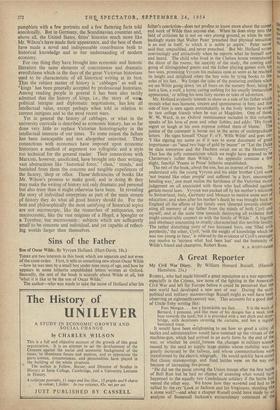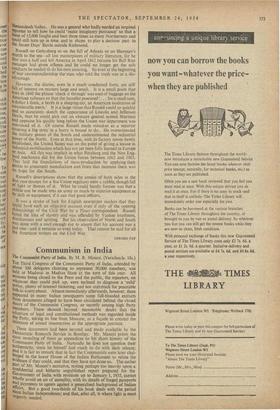A Great Reporter
My Civil War Diary. By William Howard ,Russell. (Hami sh
Hamilton. 21s.) •
RUSSELL, who had made himself a great reputation as a war reporter, especially in the Crimea, saw none of the fighting in the American Civil War and left for Europe before it could be perceived that the new world had developed a new sort of war. During the early political and military manoeuvrings Russell might as well have been observing an eighteenth-century war. This accounts for a good deal of Uncle-Toby writing like:
Fort Morgan . . has a formidable sea face.... It is the'work of Bernard, I presume, and like most of his designs has a weak long base towards the land; but it is provided with a wet ditch and draw' bridge, with demilunes covering the curtains, and has a regular bastioned trace. •
It would have been enlightening to see how so good a critic of tactics and administration would have summed up the virtues of the machine-gun, which had arrived in an early form by the end of the war, or whether he could.foresee the changes in military science caused by the need to supply large armies whose mobility was so greatly increased by the railway, and whose communications Iv, le transformed by the electric, telegraph. He would quickly have noted that classic manoeuvrings and fixed battles were on the way oat because of increasing fire-power. • He did see the panic among the Union troops after the first battle of Bull Run but he had no chance of assessing what would htoe happened to , the equally raw Confederate soldiery if the battle had veered the other way. We know how they wavered and had to he rallied by the cry 'Look at Jackson and his Virginians, standing like a stone wall!'—and what a chapter Russell could have made by an analysis of Stonewall Jackson's extraordinary command of the
Shenandoah Valley. He was a general who badly needed an inspired reporter to tell how he could 'make imaginary puissance' so that a force of I5,000 fought and beat three times as many Northerners and could still turn up in time and in shape to play a decisive part in the Seven Days' Battle outside Richmond.
Russell on Gettysburg or on the NI of Atlanta or on Sherman's March to the sea—all lost masterpieces of military literature, for he flew into a huff and left America in April 1862 because his Bull Run Messages had given offence and he could no longer get the safe conducts he needed tb do his own scouting. So even at the beginning of' war correspondentship the man who told the truth was at a dis- advantage.
However, the diaries, even in a much condensed form, are still full of interest on matters large and small. It is a small point that even in 1860 the phrase 'check it through' was used of baggage on the American railways or that the traveller procured '... for a small sum, a dollar 1 think, a berth in a sleeping car, an American institution of considerable merit.' It is a large virtue that Russell could so quickly and so accurately sketch the appearance of Lincoln and Jefferson Davis, that he could pick out an obscure general named Sherman and appraise his quality long before the Union war department was convinced of it. Of course Russell made mistakes as a reporter covering a big story in a hurry is bound to do. He overestimated the military genius of the South and underestimated the industrial Power of the North. Even at that time, with its factory towns barely established, the United States was on the point of giving a lesson in industrial mobilisation which has not yet been fully learned in Europe or Asia. All this was implicit in what Pittsburg and the New Eng- land mechanics did for the Union forces between 1862 and 1865. They laid the foundations of mass-production by applying their genius to armament manufacture and from that moment there was no hope for the South.
Russell's descriptions show that the armies of both sides in the first year (except for a few Union regulars) were a rabble, though full of fight or threats of it. What he could hardly foresee was that a rabble can be made into an army as much by superior equipment as by drill or equipment, if it can find good officers.
It was a stroke of luck for English newspaper readers that they could have such an objective account even if only of the opening skirmishings of the Civil War by a Times correspondent. Russell hated the idea of slavery and was offended by Yankee brashness, drunkenness and spitting. But his observation of North and South was done with a cool enough eye to assure that his account was a just one—and it remains so even today. That cannot be said for all the American writers on the Civil War.
GERARD PAY



































 Previous page
Previous page